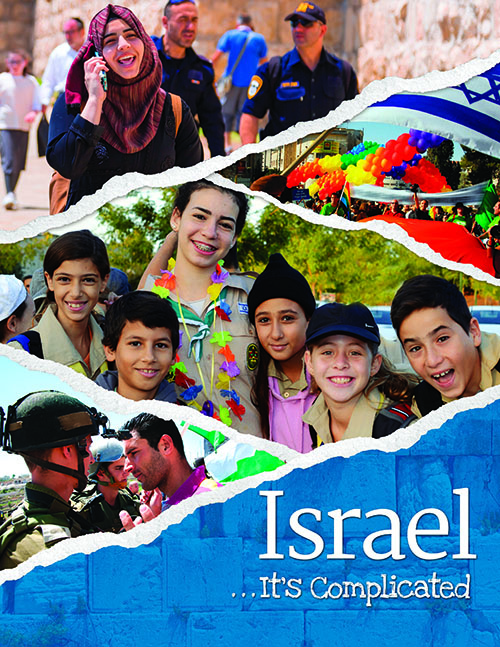Teaching Israel: It’s Complicated!
 By Richard Walter
By Richard Walter
At the Center for Israel Education, we believe that Israel and Zionism are about Jews becoming the subject of their own story rather than being the object of someone else’s.
A teen participant in a recent CIE program said, “Israel is the embodiment of freedom and the embodiment of Judaism.” Effective Israel education should begin with this core concept, and as Hillel said, the rest is commentary.
Educating students about modern Israel is not easy: we have our own personal and political biases, we often feel we don’t know enough (“impostor syndrome”), and we may be nervous about addressing the country’s many complexities.
Not easy does not mean impossible. Here are four strategies for effective Israel education:
1. Focus on broad concepts. Here are a few Israel concepts:
- returning to our ancestral homeland
- self-governance
- the centrality of the land of Israel to the Jewish people
- Israel is a complex laboratory for living a Jewish life in the modern world
Use stories and facts to emphasize these concepts. For example, I like to share with students the story of Arie “Lova” Eliav who served in the Knesset and held other important positions in Israel’s early years. Lova believed in putting Jewish values into action as a leader. He helped immigrants settle in Israel, organized rescue missions for natural disasters around the globe, and even volunteered as an orderly at Hadassah Hospital while he was a Knesset Member.
Don’t try to cover every historical fact. You are teaching young students, not a university seminar.
2. Teach Israel across all grades and in multiple units. We often hear in our work with educators, “Fifth grade (or sixth) is our Israel year.” Rather, think about all the ways that you can bring Israel into the many topics and subjects you are teaching across the many grades. For example, when I teach about Tu BiShevat, I have my students begin with the debate between Hillel and Shammai about whether the holiday should be marked on the first or fifteenth of the month. I show them monthly rainfall charts in Jerusalem and Tel-Aviv and ask them to determine who they think was right in choosing the date, which according to the Talmud, should be when “most of the year’s rains have already fallen.”
When you connect the festival to such debates about Jewish life it makes the country relevant in new ways.
3. Focus on the positive. While a lot of Israel’s complexity is about the country’s problems, there is much to celebrate. Remember that Israel, like any country, is not a finished product. As a maturing nation, it is still learning to deal with complexities such as income inequality, disputed territories, and conflicting values of religious vs secular. In addition to examining these challenges, help students understand the importance of self-determination and choice. Israel’s existence is an expression of Jewish sovereignty, an important component of which is the freedom to shape one’s own future—even if ultimately the decisions made create new challenges as they solve others.
4. Craft a vision for Israel education for yourself and your students. This need not, and should not, be an isolated process. Engage clergy, colleagues, parents, alumni, and others from your school and community in the process to help you identify and map out a plan for Israel education in your school.
In framing your vision, ensure that students gain an essential understanding of Israel’s place in the historic, cultural, political, and religious development of the Jewish people so that you can address the Arab-Israeli conflict—and other issues—in a developmentally appropriate way.
Other considerations:
- • Allow students to develop and form their own opinions about Israel, rather than parroting what we tell them to think.
- • Identify those aspects of Israel that particularly resonate with your students and use them to help build their knowledge about other areas. For example, we can learn a great deal about Israeli society or immigration history through the country’s music and literature.
- • Use original sources wherever possible, even if they are difficult for students to understand fully. Primary source documents such as sacred text, newspaper articles, documents, and statistics give an authentic insight into Israeli life and issues. Two excellent sources for such primary source material are the Center for Israel Education’s website (israeled.org) and Israel…It’s Complicated Teacher Resource Guide, available from Behrman House to accompany the student text Israel…It’s Complicated.
- • Educate yourself and don’t be afraid of what you don’t know. There are numerous websites, opportunities and organizations, including Center for Israel Education, devoted to helping Jewish educators improve their personal knowledge of Israel and develop new strategies for teaching it to students of all ages. Take part in workshops, webinars, and other forums to fill in your personal knowledge gaps. At the same time, don’t be afraid to respond to a student’s question with, “I don’t know.” This allows for communal self-discovery and helps to re-emphasize that when it comes to Israel, no one has all the answers.
For more than 2,000 years, Jews have collectively prayed for a return to Zion as an expression of Jewish memory. We should guide students to form their own opinions by providing content and context, using primary sources when possible. Our aim as Israel educators should be to create critical thinkers, not followers, no matter our personal politics. We should not be afraid if our students ultimately form a different relationship with Israel than their teachers, parents, or grandparents. As North American Jews we can move forward by educating ourselves and our communities to create understanding and dialogue. Our past, present, and future as Jews is inextricably linked with Israel.

This article is adapted from the Foreword to Israel…It’s Complicated Teacher Resource Guide. The resource guide accompanies a student text for grades 5–7, Israel…It’s Complicated.
Rich Walter is Vice President of Curriculum and Outreach at Center for Israel Education. He can be reached at rich.walter@israeled.org
Click here for a downloadable PDF version of this article.

